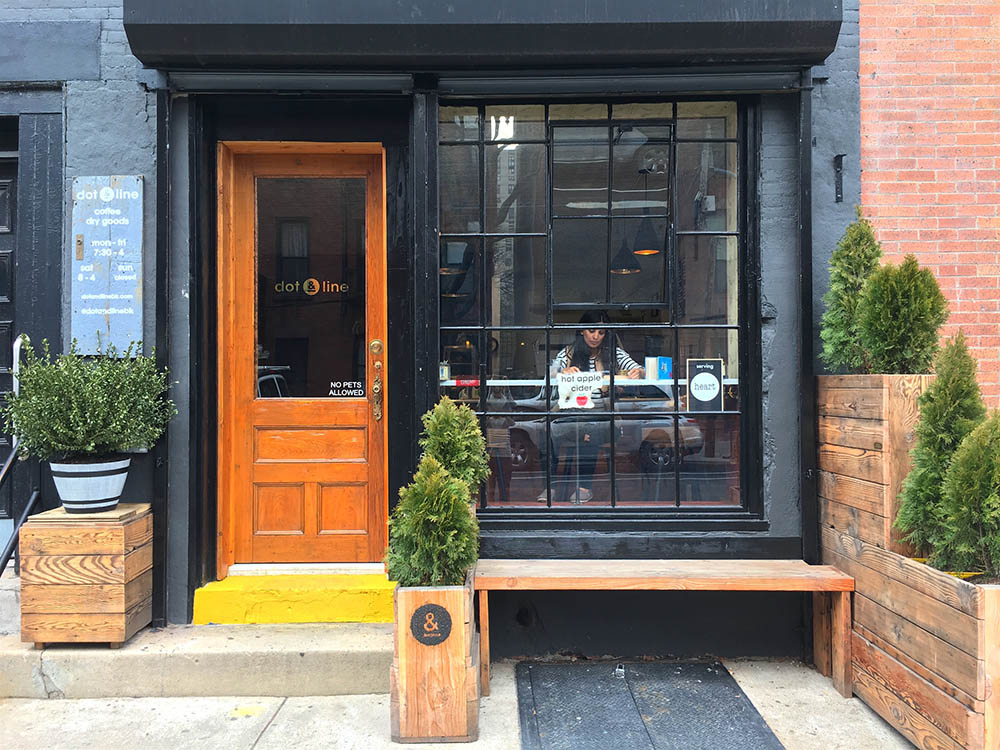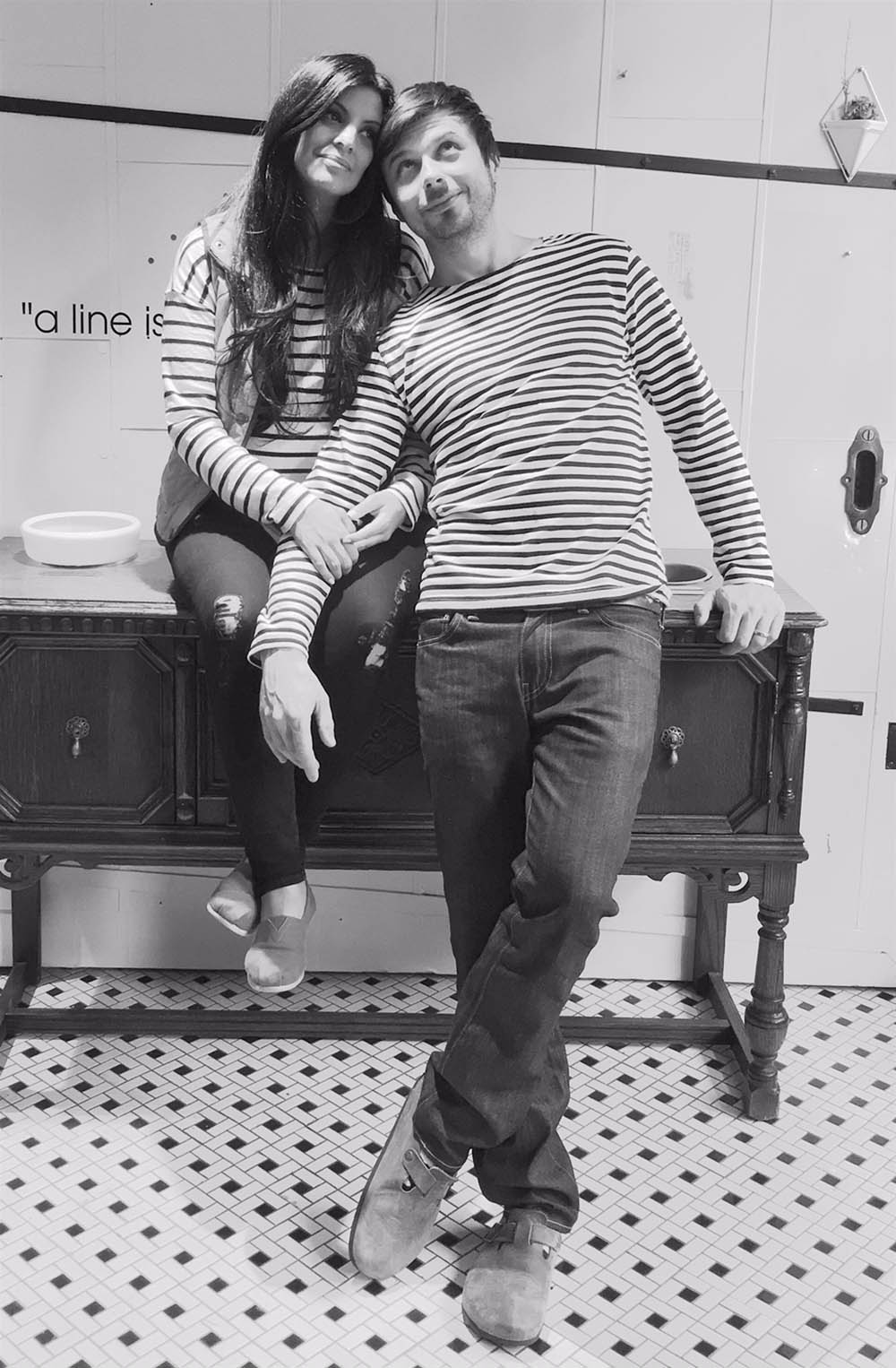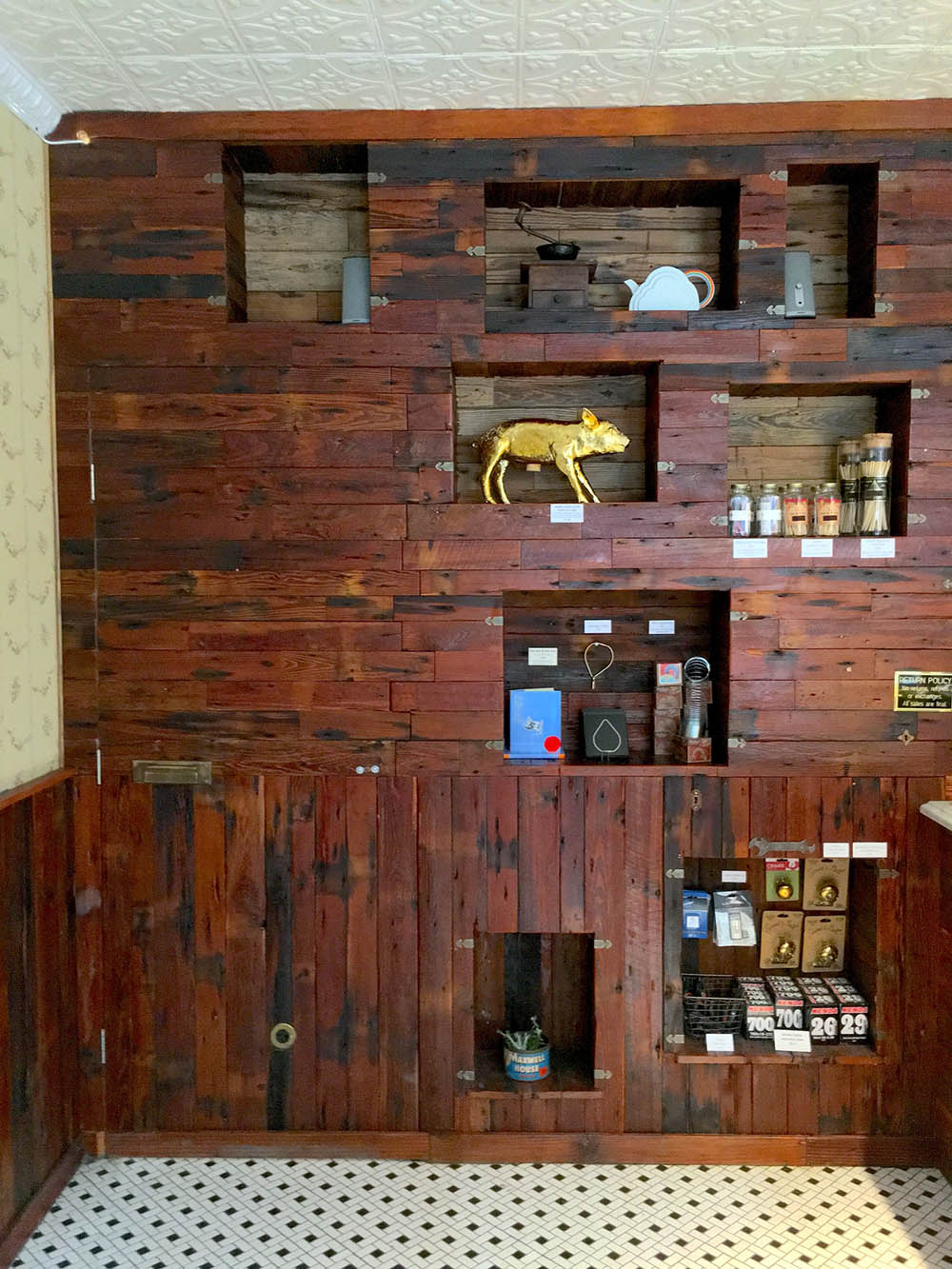Do We Need Another Coffee Shop? Yes, This One
At Dot & Line, the beauty's in the details. How the owners built this Boerum Hill newcomer to stand out from the crowd
The main roaster for Dot & Line is Heart Coffee Roasters in java-obsessed Portland, OR (Photo credit: all photos courtesy of Dot & Line)
To introduce one of the newest coffee shops in Brooklyn, I was going to rattle off the names of the many espresso bars and mini-chains and local favorites in the borough, just to illustrate how invaded it’s become. But then I thought, I might actually break the Internet.
Brooklyn does not want for coffee. That is a fact. From recognizable shops that carry your favorite almond milk, to your neighborhood pour-over place that rotates beans weekly, it’s impossible to estimate just how many caffeine purveyors have set up shop in Brooklyn. So let’s say there are a million coffee shops—hyperbolic, maybe, but I’m confident no one has time to count them—and then there is Dot & Line.
Say, for example, it’s a drizzly winter afternoon that looks precisely the same as every other drizzly winter afternoon. You want coffee but itch for a change of scenery. Maybe you wander across Atlantic Avenue and head towards Boerum Hill. And perhaps you stumble across a cute small storefront. You drink some coffee—and you are charmed. By the decor. The brew. That everyone’s actually nice. And just like that, it’s clear Dot & Line can overcome the biggest hurdle facing any new coffee shop in Brooklyn’s oversaturated marketplace: wresting customers out of their old routine and settling them into a new one.

Dot & Line is situated in a former upholstery shop on Bergen Street, a major bike-lane thoroughfare
Despite its cozy interior and carefully appointed selection of goods for sale, Dot & Line isn’t a showy place—in fact, it looks more like a living room. But that doesn’t mean every choice isn’t deliberate. Opened in January by wife-and-husband co-owners Amber Eltaieb and Bart Rozyk, both coffee aficionados and native Brooklynites (she’s from Cobble Hill; he grew up in Brighton Beach), Dot & Line began as a way to set down additional roots and give back to the place they lived in and loved. They also wanted to combine their professional strengths. Her experience as a social worker and therapist and his history as an art consultant who has also worked in the food and design worlds actually proved invaluable in the journey to opening the doors.
Their Market Research
First, they dove into research by walking around the neighborhoods and paying close attention to where people went and what they liked. “Our market research was thinking locally as a local,” says Eltaieb. “We wanted to pay attention to where we put our money and to notice the things we felt good putting our finances towards.”
And then there was transforming the shop itself. Previously an upholstery store, the building was vacant when Bart and Amber took over the space in 2015. Over four months, Bart and his father, a retired contractor, built the shop themselves using reclaimed wood from neighboring buildings. That giant factory door hanging on the wall and making a bold statement? It’s salvaged, weighs half a ton, and bringing it in the shop took the efforts of Bart, four other people—and one broken dolly.

Wife-and-husband co-owners Amber Eltaieb and Bart Rozyk
Even the wallpaper was carefully considered, with Amber spending five months searching for perfect paper reminiscent of her mom’s walls from the ’80s. And that cute name isn’t another Brooklyn moniker joining two nouns with an ampersand without rhyme or reason. The namesake of Dot & Line is a children’s book-slash-charming love story from 1963 about a dot that falls in love with a line and how initial impressions about love can be deceiving. “I gave the book to Bart when we were courting,” said Amber. “It became a theme for us.”
After cycling through some 40 coffee-related names, Amber remembered the book and thought its idea would appeal to children and adults alike. Copies of the book are for sale alongside their most intriguing and popular goods, including a charcoal toothbrush with a bamboo handle, and little caffeine chews called Go Cubes. Brooklynites like their caffeine in gummy form, too.
Yet another savvy business move was to open up the shop in an area that is, for a few block radius at least, relatively coffee-free. This draws in a wide spectrum of customers, from people who have been in the neighborhood for 30 years to those just stumbling by. So far, reception has been kind and people actually seem to—gasp—talk to one another.
A Pro-conversation Zone
One explanation might be the lack of Wi-Fi. A perk and, yes, problem with most coffee shops is how they double as workspaces for Brooklyn’s army of freelancers and remote workers. Many jokes have been cracked about glassy-eyed hipsters hunched over their Apple laptops, knocking back espressos to make their deadlines or keep up their frantic Twitter scrolling. When a coffee shop is stripped of the almost-mandatory perk of free Wi-Fi, it’s also stripped of that desperate, throbbing worker-bee buzz. You are left instead with what our disconnected forefathers might have called “peace and quiet.” All the better for you to enjoy your pastries from neighborhood favorites One Girl Cookies and Bien Cuit.
But these are all parts of the business that can be observed from a consumer’s eye. What’s it really like to have a family-run coffee shop in Brooklyn? What challenges arise, from the macro to the micro?
“Our observations over time of people pursuing their dreams is that the dream can get very easily overwhelming and there isn’t a lot of grounding,” says Eltaieb. “I think the danger is there isn’t a lot of logic that helps guide the process, which is what you really need to run a business, to keep it open, pay the bills, make sure you have enough capital, and that your model is sustainable.”
Sustainability is the key word for Dot & Line and that mentality trickles down from the vendors to ingredients to the products sourced in the store to yes, of course, the coffee.
Dot & Line is the only shop in New York that can claim Portland-based Heart Roasters as their main roaster. In coffee-obsessed Oregon, Heart is something of a religion. Dot & Line receives updates every week on what’s in season and places new orders depending on how quickly they run out.

Happily Wi-Fi free, Dot & Line is made for chatting and browsing
Keen observers will also note that the espresso machine is set up very purposefully to show off each drink as it’s being prepared. The emphasis here is to showcase the pourers and methods, not to be surprised by whatever shows up in your mug.
Educational Java
Amber said that around eight years ago, when she was first getting into third-wave coffee, it wasn’t a very approachable hobby. That’s why Dot & Line takes pride in using layman’s terms and providing an entrée for coffee novices. When’s the last time a barista asked you, “Would you like to sample the cold brew?” which is a question I received from the super-knowledgable and friendly barista Zenda on a recent visit. People can sample ice cream, Amber notes, so why not coffee?
There’s a good chance someone you know, or maybe even you, in a pensive moment of job-quitting fantasy, has loudly declared they’d really love to own a coffee shop. What a wonderful gig! To sit and drink coffee and chat with friends all day. Let the record show, however, that the behind-the-scenes work is far from the scone-nibbling dream you might imagine. “Every waking moment you’re thinking about it,” says Amber. “You can’t separate like it’s a 9-to-5 job. You are what you are making.”
Another hitch: People often forget that a coffee shop is actually a food-service business. “There’s a lot of responsibility, including health department regulations,” says Amber. “It looks like you’re opening a little coffee shop but on the back end it’s considered a restaurant. You’re under the same scrutiny and same rules.”
The Two-Way Street
And that’s not to mention the actual 80-hour work week of running it as a business. Initially, Bart and Amber split up tasks according to their professional strengths, but after the shop opened, all bets were off. Now they’re organically dividing responsibilities like physically managing the shop, human resources and market research.

Bart and his father built the shop themselves using reclaimed wood from neighboring buildings
There is one aspect they both enjoy and share in equally: interacting with customers and the neighborhood they respect. “This is the kind of business where you can’t just sell a product,” says Amber. “You have to build a relationship, and you live and die by your regulars and community to support you and trust you.”
That two-way street seems to be flowing well in both directions. Opening in the winter is a mighty feat for any new storefront, and spring should bring in even more foot traffic—and bike traffic, too. They already sell handsome bike accessories, but soon Dot & Line will offer free air for cyclists whizzing by in the bike lane. Perhaps that’s the real trick of operating a successful business in Brooklyn: providing value, one neighbor at a time.










